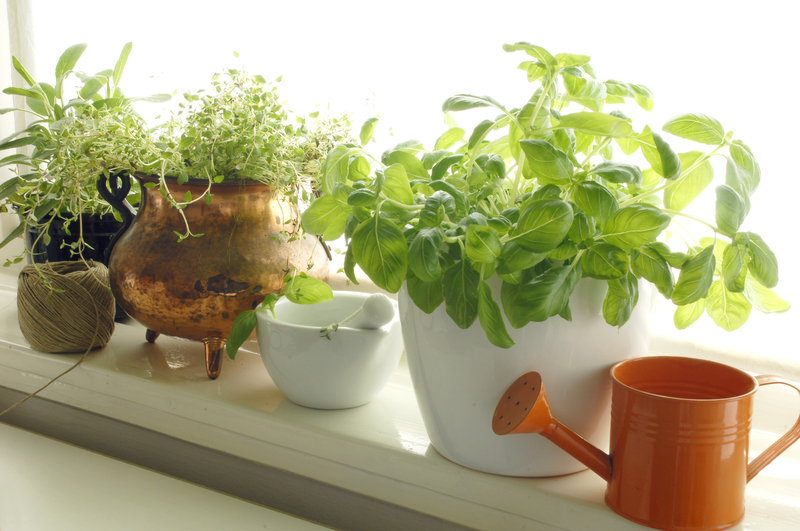Zen Garden Designs to Make Your Outdoors a Peaceful Retreat
Posted on 08/06/2025
Zen Garden Designs to Make Your Outdoors a Peaceful Retreat
Transforming your outdoor space into a sanctuary of tranquility and calm is more accessible than ever through the timeless art of Zen garden design. Originating from Japanese culture, Zen gardens--also known as karesansui or "dry landscape" gardens--are meticulously crafted to inspire meditation, reflection, and serenity. Whether you own a sprawling backyard or a compact patio, you can embrace the elegance of Zen-inspired landscaping to create your personal peaceful retreat.
What is a Zen Garden?
A Zen garden is a stylized landscape composed primarily of rocks, gravel, sand, and carefully pruned plants. Its design elements represent the essential aspects of nature such as rivers, mountains, islands, and even the ocean, all interpreted in a minimalist yet meaningful way. Unlike lush, colorful gardens, Zen gardens utilize simplicity, neutral colors, and a thoughtful arrangement to embody peace and mindfulness.
- Gravel or Sand: Represents water or emptiness, often raked into swirling patterns.
- Rocks: Symbolize islands, mountains, or living beings.
- Moss and Low Plants: Add subtle greenery and texture.
- Bamboo or Wooden Elements: Provide structural beauty and a natural touch.

Benefits of Zen Garden Designs
The Zen principle is not just about aesthetics. Incorporating Zen garden elements into your outdoor spaces offers several significant benefits:
- Reduces Stress: The serene design and repetitive tasks like raking gravel can lower anxiety and promote calm.
- Enhances Mindfulness: The simplicity invites meditation and helps you focus on the present moment.
- Low Maintenance: Zen gardens require less watering and care than traditional gardens.
- Versatile Design: They can fit any outdoor space, large or small.
- Year-Round Beauty: Minimalist design ensures it remains attractive in all seasons.
Key Elements of Zen Garden Landscaping
To master the art of Japanese Zen garden design, it's vital to understand and combine the essential elements:
Rocks & Stones
At the core of Zen garden landscaping are rocks and stones. Carefully placed to mimic natural scenery, they serve as focal points, symbolize mountains, or act as islands in the sand's "sea." Select rocks of varying shapes and sizes for the most authentic effect.
Gravel or Sand
Fine gravel or sand acts as an abstract representation of water. By raking intricate patterns, you create the illusion of gentle waves or rippling ponds. This daily or weekly ritual encourages mindfulness and relaxation.
Plants
While plants are used sparingly, they add depth and life. Choose low-maintenance, shade-loving varieties such as moss, ferns, or Japanese maple trees for an authentic touch.
Water Features
Although not traditional to dry gardens, integrating a water feature can amplify your space's peaceful ambiance. A small koi pond, a trickling bamboo fountain, or a still reflecting pool becomes a dynamic element of your Zen-inspired landscape design.
Stepping Stones and Bridges
Meandering pathways of stepping stones or rustic wooden bridges suggest a journey, guiding visitors through the garden and encouraging slow, mindful exploration.
Bamboo Fencing and Screens
Bamboo screens, fences, or trellises not only provide privacy but also reinforce the meditative, natural atmosphere.
Popular Zen Garden Design Ideas
Finding the right Zen garden layout depends on your available space and personal preferences. Here are some of the top Zen garden styles for inspiration:
1. Traditional Japanese Dry Landscape (Karesansui)
This classic design focuses on rocks, raked gravel, and minimalist plantings. Karesansui gardens are ideal for quiet corners of your yard or as a front garden focal point. Encircled by a simple bamboo fence, they radiate pure tranquility.
2. Moss Garden Zen Retreat
Moss gardens showcase various moss species with subtle green hues and velvety textures. They thrive in shaded, moist spots and create a lush carpet-like effect--perfect for evoking a soft, otherworldly mood.
3. Courtyard Zen Spaces
Even if you lack yard space, a small patio or courtyard can become a mini Zen oasis. Use containers filled with white gravel, a couple of standing stones, a bonsai tree, and a bamboo water feature to create your private escape.
4. Contemporary Zen Gardens
Blend modern elements like angular concrete planters, sculptural stones, and minimalist benches with traditional materials for a sleek, up-to-date interpretation of Zen garden landscaping.
5. Zen Meditation Corners
Dedicate a section of your garden to meditation with a stone path, shaded seating, and a few artfully arranged rocks. This intentional area becomes your daily retreat for mindfulness or yoga sessions.
6. Water-Inspired Zen Gardens
Introduce soothing sound and movement with a bamboo fountain, reflecting pool, or shallow stream. Water is known to enhance relaxation and promotes the softening flow of Zen-inspired garden layouts.
How to Create Your Own Zen Garden
Ready to bring peace and elegance into your outdoor space? Follow these steps to design a beautiful Zen garden:
Step 1: Choose Your Location
- Pick a quiet, flat area--this could be a corner of your yard, balcony, or even a large container on your porch.
- Observe sunlight, wind, and drainage to plan appropriate plantings.
Step 2: Define the Boundaries
- Use natural stones, bamboo fences, or low wooden panels to enclose your garden and set it apart from the rest of your landscape.
Step 3: Prepare the Ground
- Clear the area of debris and weeds.
- Lay down a weed barrier or landscape fabric to minimize upkeep.
- Top with a shallow layer of clean gravel or sand, spreading it evenly.
Step 4: Arrange Stones and Features
- Group stones and rocks thoughtfully; odd numbers (groups of 3 or 5) look most natural.
- Place a water basin, bamboo feature, or stepping stones based on your chosen design.
Step 5: Select and Plant Greenery
- Choose a few carefully pruned shrubs, moss, or ferns.
- Place them to soften hard edges and add subtle organic shapes to your garden.
Step 6: Rake Patterns
- Use a specialized Zen rake or a simple hand tool to create rippling wave or circular designs in the gravel.
- Change patterns periodically for a fresh perspective and deeper mindfulness practice.
Top Plants for Zen Gardens
Plants in Zen gardens are used with restraint; each is carefully chosen to fit the minimalist and contemplative aesthetic. Some excellent choices include:
- Moss: Such as Leucobryum glaucum or Sheet Moss for a lush, soft floor
- Japanese Maple (Acer palmatum): With delicate, colorful foliage
- Bamboo: Adds height, sound, and privacy
- Boxwood: Pruned into soft mounds for subtle structure
- Ornamental grasses: Like Hakonechloa for gentle movement
- Ferns: For shade and texture
- Azaleas or Camellias: Add seasonal bursts of color
Zen Garden Accessories and Ornaments
Enhance the authenticity and function of your Zen garden retreat with traditional accessories:
- Stone Lanterns (Ishidoro): Elegant, historic ambiance
- Bamboo Fountains (Shishi-odoshi): Adds meditative sound
- Water Basins (Tsukubai): For symbolic cleansing
- Buddha Statues or Statuettes: Inspire mindfulness
- Wooden Benches: For contemplative seating
- Bonsai Trees: Symbolize harmony and patience
Maintaining Your Zen Garden
One of the charms of Zen landscape design is its simplicity and relatively low maintenance. However, consistency is key to preserving its beauty and meditation-friendly vibe.
- Regular Raking: Smooth and refresh gravel or sand patterns.
- Weeding: Pull any weeds promptly to maintain minimalist aesthetics.
- Pruning: Shape trees, shrubs, and moss for tidy lines.
- Cleaning: Rinse or brush rocks to keep them clear of debris.
- Seasonal Update: Adjust layout or plantings with each season for renewed interest.

Tips for a Zen Outdoor Retreat
Bringing Zen garden tranquility to your outdoors is all about intention and simplicity. Keep these pro tips in mind:
- Less is more. Avoid clutter by limiting the number of rocks and plants.
- Balance hard and soft elements, like stones and moss, for harmony.
- Focus on negative space--the "emptiness" is as evocative as the objects.
- If possible, choose natural materials for a more authentic and eco-friendly retreat.
- Add subtle lighting for evenings, such as lanterns or hidden LED strips.
- Create gentle sounds with wind chimes or trickling water for deeper relaxation.
- Personalize your Zen retreat with elements that speak to your sense of peace.
Conclusion: Create Your Peaceful Outdoor Escape
A Zen garden design for your backyard or patio is more than just landscaping--it's a pathway to daily peace and inspiration. By combining rocks, sand, minimalist plants, and thoughtful accessories, you create a stunning outdoor Zen retreat that soothes the mind and spirit. Use these principles, ideas, and examples above to tailor a space that fits your needs, whether it's for meditation, relaxation, or quiet enjoyment. Start your journey towards a more harmonious life today--let your outdoors become a sanctuary of calm with a beautiful Zen garden!

